Iran Demands Sweden Release Man On Trial For Prison Killings
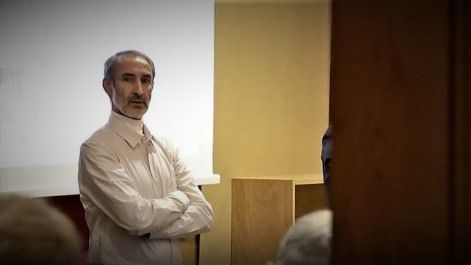
Iran’s Foreign Ministry has summoned the Swedish ambassador to Tehran over the case of Hamid Nouri, a former Iranian judicial official on trial for his role in prison purges in 1988.

Iran’s Foreign Ministry has summoned the Swedish ambassador to Tehran over the case of Hamid Nouri, a former Iranian judicial official on trial for his role in prison purges in 1988.
The ministry called in Ambassador Mattias Lentz on Sunday evening to convey the Islamic Republic’s protest over the continued imprisonment of the former Iranian official, describing charges against him as “baseless and fabricated”.
The Islamic Republic said the trial is a “political show” and urged Sweden to release the Iranian national.
The ministry called his detention “totally illegal” and driven by “false allegations made by the Mujahedin-e-Khalq Organization (MEK) terrorist organization and the hostile smear campaign against the Islamic Republic.”
In the 89th session of Hamid Nouri’s trial on Friday, plaintiffs' lawyers said Nouri played "an active role" in the execution of thousands of political prisoners in Iranian prisons and requested the court hand out the maximum sentence of life imprisonment.
Nouri, allegedly a former deputy prosecutor at Gohardasht Prison near Tehran at the time of the killings, has been charged with “war crimes, crimes against humanity, torture, and participating in the continued crime of refusing to return the bodies of executed prisoners to their families.”
Following the announcement of the prosecution's demand for life imprisonment, Sweden's Foreign Ministry advised citizens against making unnecessary trips to Iran, citing increased "expression of dissatisfaction" of Iranian officials over Nouri's trial.
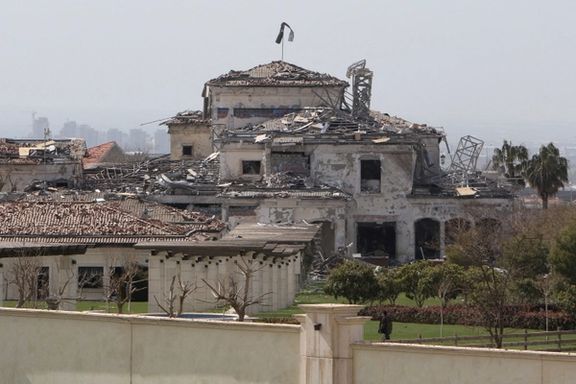
A missile attack targeted an oil refinery in Iraq's northern city of Erbil on Sunday causing a fire that was later brought under control, the Iraqi security forces said in a statement.
A missile also landed in the outer fence of the refinery without causing any casualties, the statement added.
Earlier on Sunday, the anti-terrorism authorities in Kurdistan region said six missiles landed near the KAR refinery in Erbil, adding they were launched from Nineveh province.
The security forces said they found a launch pad and four missiles in the Nineveh Plain after the attack and defused them.
Iraqi Prime Minister Mustafa al-Kadhimi said the armed forces will pursue the perpetrators of what he called a "cowardly attack", while discussing the security situation in a phone call with Kurdish leader Masoud Barzani, the prime minister's office said on Twitter.
Three missiles also fell near the refinery on April 6, without causing any casualties. Sources in the Kurdistan Regional Government told Reuters then that the refinery is owned by Iraqi Kurdish businessman Baz Karim Barzanji, CEO of major domestic energy company the KAR Group.
In March, Iran attacked Erbil with a dozen ballistic missiles in an unprecedented assault on the capital of the autonomous Iraqi Kurdish region that appeared to target the United States and its allies. Later reports emerged that KAR Group might have been the target for plans to export natural gas to Europe.
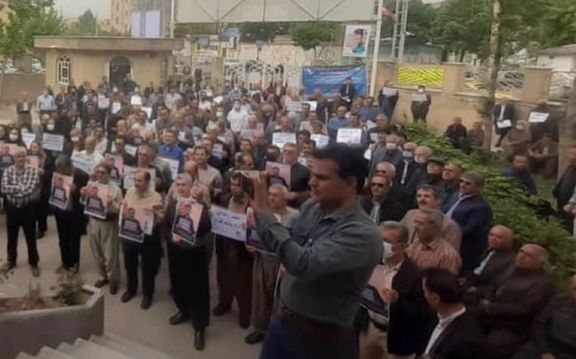
Iranian security forces used force against protesting teachers on Sunday in several cities and arrested around a dozen protestors and union activists.
Iranian teachers staged a new round of protests across the country on Sunday, May1, the international Labor Day, organized by the Coordination Council of Iranian Teachers’ Trade Associations.
According to the association's Telegram channel, despite earlier arrest of several leading figures of the teachers’ movement, a large number of teachers tried to gather in front of the parliament at Tehran's Baharestan Square but they were forced by large contingent of security forces to leave the area.
In their rallies Sunday, teachers chanted slogans against Education Minister Yusef Nouri and Parliament Speaker Mohammad-Bagher Ghalibaf whose family’s recent shopping trip to Turkey has led to widespread condemnations and demands for his resignation.
Protesters also demanded the release of their imprisoned colleagues. In Arak in central Iran protesters chanted "Teachers are vigilant, they hate discrimination" while in Shiraz, Fars Province, they said "Our enemy is right here, it's a lie to say it's America".
In Bushehr, as seen in videos posted on social media, security forces on Sunday attacked and injured several protesters and arrested at least six. There have also been reports of arrests in Langaroud in northern Iran, Marivan and Saqqez in western provinces of Kordestan and West Azarbaijan, and Tehran.
The association recently said in a statement that the teachers' movement would not be subdued by security and judicial crackdowns on union activists including sentencing them to four to 12 years in prison.
Teachers say they will continue their protests until authorities meet their demands including the implementation of decade-old legislation that would bring the salaries and pensions of 750,000 teachers in line with other civil servants as well as the freedom of their colleagues who have been imprisoned for their trade union activities.
Police raided the homes of several union activists in Tehran and arrested at least four on Saturday. Eskandar Lotfi, spokesman of the Coordination Council of Iranian Teachers’ Trade Associations, said Saturday that tens of other teachers from different parts of the country were summoned to court.
Lotfi and two other union members were also arrested early Sunday. Esmail Abdi, a member of the association, went on hunger strike Sunday in protest to the clampdown on union activists.
Following protests across Iran in December, the executive board of Education International, the Brussels-based federation of trade unions of teachers and education workers, in a resolution demanded respect for the "rights of teachers and education workers to organize and to freedom of association and freedom of speech including the right to peaceful assembly, without fear of intervention by the authorities" as well as “institutionalizing dialogue” with teachers' representative organizations.
Four years of deep economic crisis in Iran following the introduction of United States ‘maximum pressure’ sanctions in 2018 has led to sharp increases in living costs and to labor unrest. In January hundreds of firefighters and staff from the judiciary took to the streets in several cities. Prison guards have also picketed to protest their salaries.
People from different walks of life, including teachers, nurses, firefighters, and even staff members of the judiciary department and prison guards, have held regular protest rallies or strikes to demand higher salaries.

Iran is facing an uphill battle in its foreign relations, an analyst has said in Tehran in the wake of Turkish President Recep Erdogan’s visit to Saudi Arabia.
In a shift in its regional policy, Erdogan this week visited Saudi Arabia, while having delayed a similar visit to Iran. Abdolreza Farajirad, a professor of international relations in Tehran told ILNA news website that Erdogan is signalling his preference to strengthen ties with Riyadh amid his country’s economic crisis.
Iran is under United States’ sanctions, he said, and Erdogan needs economic partners.
Turkey and Saudi Arabia have a common will to "reactivate a great economic potential" between the two countries, Erdogan said on Saturday, after his first trip to the kingdom since 2017.
Speaking to reporters on a flight back from Saudi Arabia, where he sought to mend frayed ties, Erdogan said the sides were determined to accelerate efforts for the common interests and stability of the region, Turkish media reported.
"We agreed with Saudi Arabia to reactivate a great economic potential through organizations that will bring our investors together," Erdogan said.
Farajirad said that Erdogan is acting according to Turkey’s national interests. US sanctions have reduced Turkish-Iranian commerce and what Ankara needs is investments and trade. He pointed out that Erdogan’s outreach began with the United Arab Emirates and then Israel, culminating with his trip to Saudi Arabia.

Over his long tenure, Erdogan has shown that he is capable of shifting his foreign policy direction to address Turkey’s needs, Farajirad said emphasizing the importance of pursuing national interests.
Although he could not openly criticize the Islamic Republic in Iran’s controlled media environment, the analyst was indirectly drawing a parallel between Turkish foreign policy and Iran’s ideological approach to foreign policy.
“This shows our foreign policy is at an impasse, although I don’t want to criticize the foreign ministry, but until there is no agreement in Vienna, the impasse will continue,” Farajirad argued.
After more than year of negotiations with world powers, particularly with the United States in Vienna, Iran has still not agreed to revive the 2015 nuclear agreement, JCPOA, demanding that its Revolutionary Guard (IRGC) be removed from a US list of terrorist organizations.
Washington, in return, maintains that the terrorist designation has nothing to do with the nuclear issue, and if Tehran wants non-nuclear sanctions to be removed it should be willing to discuss its destabilizing regional role.
So far, the Islamic Republic has remained defiant, emphasizing its opposition to Israel and Arab countries that have normalized ties with the Jewish state.
The IRGC continues to speak loudly and emphasize its ongoing support to militant groups in the region.
Farajirad argued that in the meantime, Riyadh’s foreign policy has become active again, taking positions which make it easier for other countries to draw closer to its positions. As a result, it has had successes in improving ties with Qatar and Turkey and also influence events in Lebanon and Pakistan, where the Muslim League has returned to power.
Erdogan, in turn, has found the moment opportune for trying to benefit from Saudi Arabia’s vast financial resources, especially at a time of high oil prices, “to benefit from trade with Saudi Arabia and investments by Riyadh.”
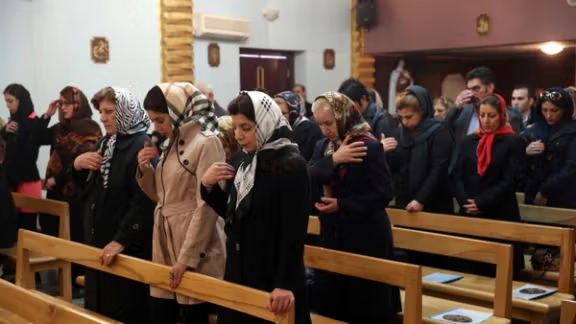
A group of Iranian Christian converts issued a statement on Sunday in protest to the Islamic Republic’s violation of their rights to work, even in private businesses.
In their statement published by the United States-based Human Rights Activists' News Agency (HRANA), they said the Islamic Republic authorities seek to impoverish and isolate them from society.
“The Islamic Republic has deprived Persian-speaking Christians of the right to work and employment”, they said, bemoaning the serious obstacles the authorities have created for their employment and self-employment that have left them with no job opportunities.
They said the measures taken against them contradict Iran’s the international obligations and even the Islamic Republic’s constitution.
While Iran persecutes followers of the Baha’i religious community and rejects esoteric philosophies and cults, the constitution recognizes Christianity, Zoroastrianism and Judaism – whose members have official representatives in parliament. However, churches that are allowed to operate are ethnic Christian congregations, such as Armenians and Assyrians.
These established churches are discouraged from accepting new members, and there is official suspicion of evangelical, millenarianist Protestant sects that hold services in Persian. Renouncing Islam is forbidden by Sharia and the punishment could be death, although the government in Iran pursues lesser punishments.
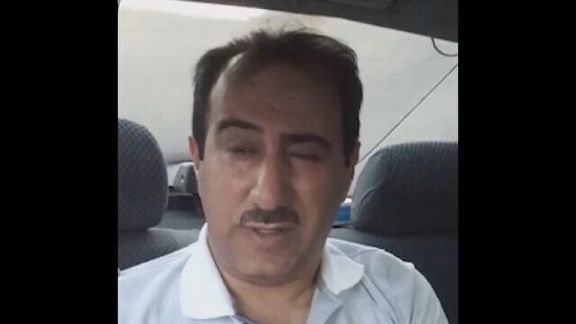
Nearly total silence reigns in Tehran over Israeli media's claim that the Mossad apprehended and interrogated a Revolutionary Guard agent at his home in Iran.
A short audio recording was published by Israeli media on Saturday with a photo of a man introduced as Iranian national Mansour Rasouli, 52. In the audio recording, Rasouli says he was sent to Turkey by the Revolutionary Guards (IRGC) to establishing an operational network to assassinate an Israeli diplomat in Istanbul, a Germany-based US general, and a journalist in France.
The audio recording surfaced hours after Iran International's report of the alleged Iranian triple assassination plot. Iran International's diplomatic sources said a member of the IRGC'S Qods Force had been detained in an unnamed European country for assassination plots in Germany, France and Turkey.
Apparently duped by his interrogators' claim that they were from one of Iran's many intelligence bodies, Rasouli says in the recording that accepting to carry out the operation was a mistake that he will never make again.
Israeli television channels including Channel 12 which broadcast the recording, without providing a source according to The Times of Israel, claimed it was made by Mossad operatives posing as Iranian secret service at Rasouli's home in Tehran but did not hold him after the interrogation. The newspaper also said Hebrew-language outlets had reported that some Israeli officials had confirmed earlier reporting of the plot by Iran International on Saturday.
Channel 12 news added, also without citing a source, that the Shin Bet security agency — which generally operates within Israel — also participated in the detention in Iran.
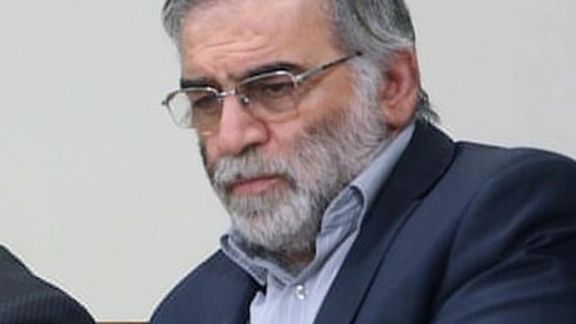
Iranian media, except the semi-official Mehr news agency and hardline Mashregh news website that have made very brief references to a Haarez report on the foiled plot to assassinate an Israeli consulate worker in Turkey, have remained silent about Iran International's report and the audio recording shared by Israeli media.
Iranian, Israeli, and Turkish officials have not made any comments about the reports of the alleged assassination plots.
It is not clear whether Rasouli, whose current whereabouts are not known, and the operative that diplomatic sources said had been detained in Europe are the same person or different agents involved in the same operation.
Israel has allegedly carried out dozens of operations and assassinations inside Iran, including the assassination of Iran's top nuclear man and senior IRGC member Mohsen Fakhrizadeh in November 2020 for which it has never officially taken responsibility. Ex Mossad Chief Yossi Cohen in June 2021 strongly suggested Israel was behind attacks on Iranian nuclear facilities.
Referring to the theft of thousands of Iranian secret nuclear document in February 2018 from a warehouse near Tehran, Cohen said more than 20 Mossad agents were involved in the operation. He said the agents were not Israelis, adding that all of them are alive and some of them have already left Iran.
Following Cohen's remarks, former President Mahmoud Ahmadinejad who in the past few years has cast himself as an opposition figure, alleged that the highest-ranking Iranian intelligence official in charge of countering Israeli spies in Iran was himself an agent of Israel.
Ahmadinejad did not name anyone nor specify the time period in question but attributed the success of Israel's intelligence operations in Iran to the high level of Tel Aviv's influence and infiltration in the Iranian intelligence and security agencies.